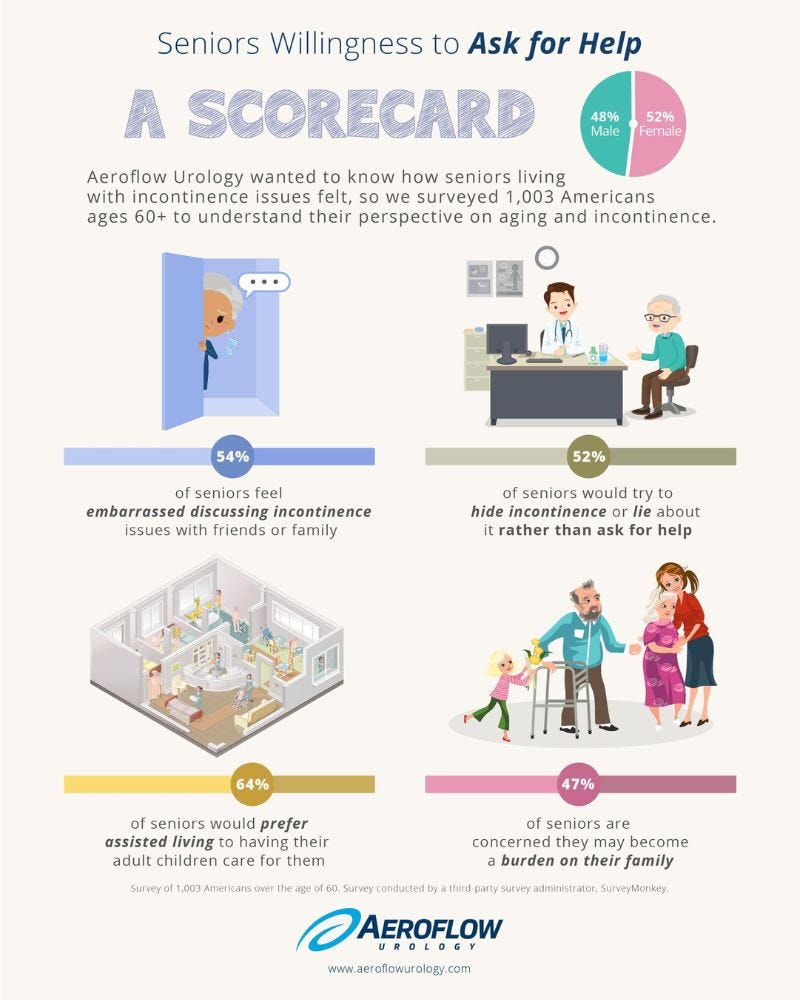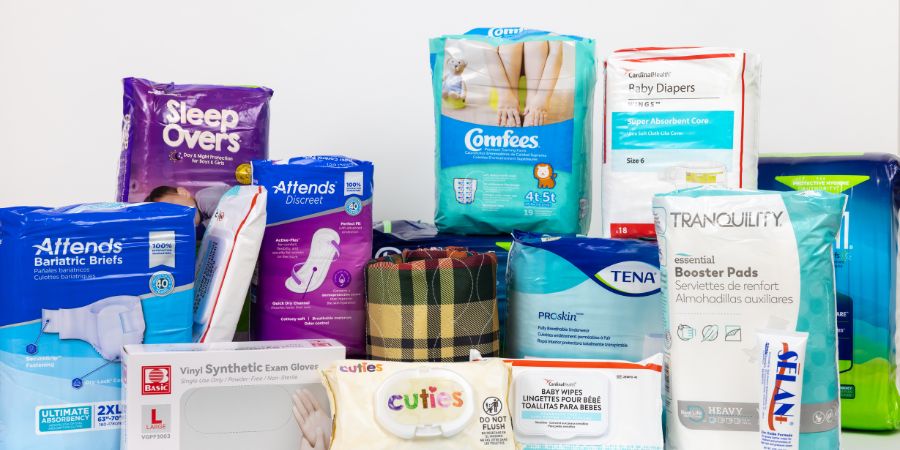Losing control of your bladder-otherwise known as urinary incontinence- is probably never something you feel you want to share details about, but it happens to millions of people, especially as they age.
Still, many seniors are too ashamed to talk about incontinence. Aeroflow Urology surveyed around 1,000 adults over 60 and found that communication about incontinence is lacking- in fact, almost half of those surveyed said if they experienced it, they wouldn’t tell anyone about it.
In this post, we’ll explore:
- Why incontinence develops as we age.
- How we can improve communication around incontinence.
- How to treat incontinence symptoms as a senior.
Check Your Eligibility
2 Easy Steps
Discover the continence care essentials available through your Medicaid plan.
What Is Urinary Incontinence?
Urinary incontinence (UI) is the loss of bladder control, and you can experience a variety of types, including:
- Stress incontinence: Experiencing leakage when you cough, laugh, sneeze, lift heavy objects, exercise, or have sex.
- Overactive bladder (OAB)/ urge incontinence: Feeling the sudden and urgent need to pee, resulting in using the bathroom more than usual (more than 8 times in 24 hours).
- Overflow incontinence: Dribbling small amounts of urine (post-void residual) throughout the day due to not emptying your bladder fully.
- Mixed incontinence: Experiencing more than one type of urinary incontinence at once.
UI affects over 50% of females and about 14% of males in the United States and affects one of every two older women over the age of 65.
Why Does UI Develop as We Age?
The chance of developing UI increases as we age due to some common causes, including:
- Menopause, pregnancy, and childbirth.
- Certain health conditions, such as Alzheimer’s disease, Multiple sclerosis, Parkinson’s disease, etc.
- Stroke
- Obesity
- Naturally weakening pelvic floor muscles, urethra, and urethral sphincter.
- Stiffening bladder muscles.
- Decreased neurological responses.


Even if you don’t have pre-existing medical conditions that cause UI, it can still develop. Your pelvic floor muscle strength decreases, and your bladder muscle fibers are replaced with tough fibrotic tissues. Your neurological responses, such as knowing when you need to void your bladder, also reduce in response time.
Survey Results
Aeroflow Urology conducted a survey to better understand seniors’ experiences with independence and aging, particularly when it comes to needing assistance from friends and family members with incontinence.
After using a third-party surveyor to poll 1,003 adults over 60 in the United States, we can now illustrate just how crucial the need for better communication is among seniors and their close ones as they age.
- 44% of seniors either experience issues with incontinence or know someone else who does.
- 68% discovered that someone they know suffers from incontinence because the person told them.
- 32% learned of someone else’s incontinence issues by noticing an accident.
- 54% said that if they experienced incontinence, they would feel embarrassed discussing it with their friends or family.
- 48% of seniors would ask friends or family for help if they had incontinence issues.
- 47% said if they experienced incontinence symptoms, they wouldn’t say anything about it and would hope it would go unnoticed, while 5% said they would lie about it to hide it, meaning more than half of seniors wouldn’t be open about it.
- 25% said they had either skipped a social event due to incontinence or know someone else who has.


- 96% of participants do not have any of their adult children caring for them.
- 64% would prefer assisted living over having their adult children care for them if their daily routine became too difficult.
- 78% would not be opposed to entering an assisted living facility if they could not care for themselves.
- 47% of seniors are concerned that they may become a burden to their families.
When it comes to using incontinence supplies:
- 10% use briefs.
- 9% use pull-ups.
- 22% use bladder control pads.
- 6% use bed pads.
- 2% use catheters.
- 66% use nothing – if up to 44% of older adults suffer from incontinence and only 34% use supplies to manage it, that means there are seniors with incontinence who aren’t taking steps to control it!
Improving Communication
Our survey shows that UI is not talked about enough in the United States. Whether it’s in our healthcare industries, family lives, or friendship circles, we need to develop more transparency when discussing incontinence issues.
We can start by making it clear that incontinence is nothing to be ashamed of, and it’s prevalent among people, especially in older people and the geriatric community. We can also educate ourselves and our loved ones about why incontinence develops and how to manage symptoms properly because while it is common, it’s not normal.
Managing UI Symptoms
Seniors can manage symptoms of UI with several treatment options that can be used to regain their quality of life. Use these tips to help a loved one or try them out yourself.
Bladder Control Products
Using incontinence supplies is the easiest way to manage senior incontinence. Adult briefs (diapers), protective underwear, and bladder control pads are absorbent and keep you cool and dry while being discreet enough to wear under clothes.
Many older people may be able to get their incontinence products for free with their Medicaid or other private insurance plan and Aeroflow Urology. We help those who qualify to get high-quality incontinence products covered by insurance rather than paying for them out of pocket. If you are eligible for coverage, we’ll send you free product samples so you can find your perfect fit before ordering supplies. We’ll also ship your bladder control products in discreet packaging for free on a monthly basis right to your front door. Refilling is an easy process, too, with text and email reminders sent when it’s time to order more supplies.
Pelvic Floor Exercises
No matter what age you are, Kegel exercises can strengthen your pelvic floor muscles. If you have less mobility, you can do these exercises without anyone knowing!
To do them, locate your pelvic floor muscles and squeeze them for 3 seconds, holding for 3 seconds. Repeat this over 10 times. Adding this to your daily routine will bring strength back to your pelvic floor and prevent leakage.
Diet & Hydration


Certain foods and drinks can irritate your bladder, which increases UI symptoms. Avoid spicy foods, carbonated drinks, caffeine, citrus fruits, alcohol, and tobacco. Eat lots of fiber to prevent constipation because it can also irritate the bladder. Be sure your fluid intake is keeping you hydrated. Drinking water can also help reduce the risk of urinary tract infections (UTIs).
Bathroom Schedules
Some seniors will need help making it to the restroom, so it may be helpful to keep a bathroom schedule to avoid accidents.
Medications
Certain medications, such as anticholinergics, relax the bladder so you won’t feel the urge to go to the bathroom quite as often. Speak with your healthcare provider to see if bladder control medications fit your unique needs.
Get Free Products Through Insurance
Incontinence supplies can quickly become costly, especially if you’re on a fixed income. Through Aeroflow Urology, you can receive free bladder control products through your Medicaid plan each month.
All you have to do is fill out our quick and easy 2-step Eligibility Form, and we’ll take care of the paperwork. We’ll verify your insurance coverage with your provider, and one of our Continence Care Specialists will review your coverage options with you in 1-2 business days. Dealing with incontinence can be emotionally taxing, but it doesn’t have to be economically taxing.
https://www.ncbi.nlm.nih.gov/pmc/articles/PMC3197263/#:~:text=Results,women%20and%2013.9%25%20in%20men.
https://www.aplaceformom.com/caregiver-resources/articles/urinary-incontinence
Information provided on the Aeroflow Urology blog is not intended as a substitute for medical advice or care. Aeroflow recommends consulting your healthcare provider if you are experiencing medical issues relating to incontinence.









